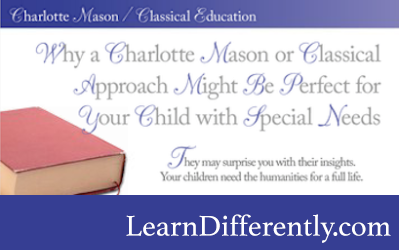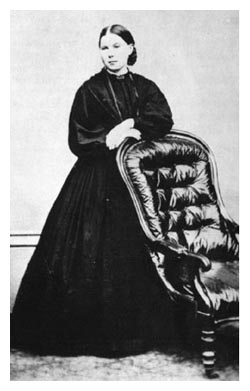Why a Classical or Charlotte Mason Approach Can Help a Child Who Learns Differently

By Kathy Kuhl After I started homeschooling, friends recommended a classical approach. My sister-in-law recommended a Charlotte Mason approach. Both sounded intriguing, but too hard. “My fourth-grader can’t read! You want me to add copywork, nature journalling, Latin, and Great Books to our day? I can’t do it!”
As I interviewed parents for Homeschooling Your Struggling Learner, I learned that I was wrong. I found parents of dyslexic kids who found Latin study made English more comprehensible. Homeschool groups like Eden Hope were adapting a classical approach for groups that included kids with all kinds of special needs.
This week I discussed “Why a Classical or Charlotte Mason Approach Might Be Perfect for Your Child with Special Needs.” It’s in The Old Schoolhouse Magazine’s online Homeschool Methods: Classical Christian & Charlotte Mason Spring 2018 Supplement.

What is a classical education?
Recently, I heard Martin Cochran, publisher of Memoria Press, answer this question. Quoting Andrew Kern, he said that classical education is “the cultivation of wisdom and virtue by nourishing the soul on the Good, the True, and the Beautiful.” (Reference below.)
Among other things, this means that the goal of education is not employment. Work is important, skills are important, but there is more to life. Education is a way to nurture your child as a complete human being. So we teach reading, but not to pass a test. We teach reading because it allows us to learn and to enjoy great stories and poetry, which are good, true, and beautiful. We teach math not to get students into universities, but because “Mathematics is the language in which God has written the universe,” as Galileo said. It’s the science of pattern. There is pattern in nature all around us. In fact, if our brains don’t see pattern, they will try to make it.
 Who is Charlotte Mason? And what does she have to do with my homeschool?
Who is Charlotte Mason? And what does she have to do with my homeschool?
“Education is an atmosphere, a discipline, a life.” These were the words of nineteenth-century British educator Charlotte Mason. She founded an teaching approach based on cultivating good habits of character and great books (“Living Books,” which she considered the opposite of textbooks). So far, this sounds similar to classical education.
Charlotte Mason also emphasized other unique themes:
- Nature study–in her words, “never be within doors when you can rightly be without.” Nature journaling is an important part of her approach, encouraging observation.
- Narration, the important skill of summarizing and stating aloud the main point of the book or passage being read.
- Exposure to great ideas through not only great books, but also great music and art.
- Integrating handwriting and spelling with the study of great literature.
There is more to Charlotte Mason’s approach, but this list gives you a taste of what makes it distinctive.
Want to learn more?
My article is just one of many in the Old Schoolhouse Magazine’s online Homeschool Methods: Classical Christian & Charlotte Mason Spring 2018 Supplement. But you can get the whole issue here, and learn more about both approaches from the experts.
How do you adapt a Charlotte Mason or Classical approach for your exceptional child? Please comment below.
Sources and resources
- Andrew Kern, “What is Classical Education?” Memoria Press, Winter 2014 issue.
- Cheryl Swope of Memoria Press is developing a special needs curriculum. You can subscribe to their journal and learn more here.
- My review of Cheryl Swope’s book, Simply Classical: A Beautiful Education for Any Child.
- Eden Hope Academy is an organization of homeschool groups with campuses around the country, offering inclusive, classical classes to support homeschooling families.
- Simply Charlotte Mason
- AmblesideOnline

 Who is Charlotte Mason? And what does she have to do with my homeschool?
Who is Charlotte Mason? And what does she have to do with my homeschool?